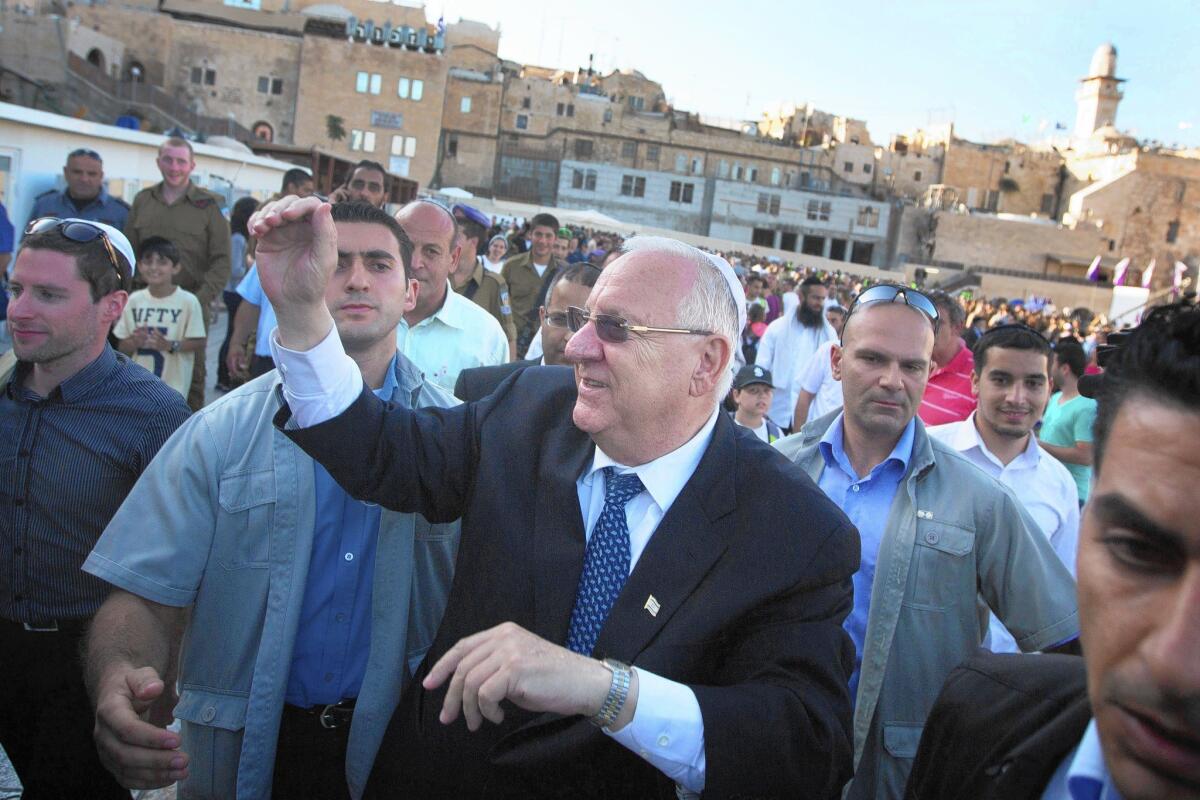Israel picks Reuven Rivlin in particularly messy presidential contest

- Share via
Reporting from Jerusalem — At the end of a tense vote that capped a messy political campaign, Reuven Rivlin was chosen Tuesday to serve as Israel’s 10th president.
Rivlin, 74, was elected by members of Israel’s 120-seat parliament to succeed the country’s longest-serving public figure, President Shimon Peres, who will be stepping down next month as his seven-year term ends just weeks before his 91st birthday.
A veteran politician, a former speaker of the Knesset, the parliament, and an opponent of an independent Palestinian state, Rivlin was the front-runner among the five final contenders, the highest number of candidates ever to seek the largely ceremonial yet influential position.
The presidency is open to any Israeli citizen residing in the country, but a prospective candidate must first secure the signatures of 10 lawmakers. The signatures are public but elections are confidential, leaving room for surprises.
After no candidate secured the majority of 61 votes required to win in the first round, a second vote was taken on the two candidates with the most ballots: Rivlin and Meir Sheetrit, two of the longest-serving lawmakers.
Rivlin, who defeated Sheetrit by a vote of 63 to 53, with the remaining ballots blank or missing, will resign from the parliament immediately and assume the presidency in July.
Political campaigns in Israel are usually festive, but few found cause for celebrating as the presidential contest got messier by the minute with political scandal and police investigations.
A series of incidents clouded the race. Early on, allegations of sexual misconduct against Silvan Shalom were not enough to trigger a criminal case but killed his candidacy.
Then came reports that Prime Minister Benjamin Netanyahu was seeking to postpone elections and possibly abolish the post altogether.
Candidate Binyamin Ben-Eliezer was felled by an eleventh-hour police investigation of financial misconduct allegations, sending him home and prompting the remaining candidates to disclose their finances, some reluctantly.
“Skeletons burst out of candidates’ closets and began dancing in the town square,” Hebrew University political scientist Yaron Ezrahi remarked in an interview.
Observers see this as a positive outcome of an otherwise unsettling campaign. Candidates for public office submit their financial information to the ethics committee of the Knesset but the statements are not made public.
Several lawmakers intend to advance legislation obliging all candidates to make financial and medical information fully transparent.
“It isn’t healthy to keep these away from the public eye in vaults,” said Shelly Yachimovich, a Labor Party lawmaker. Others propose that Israel adopt hearings such as those held in the United States to end chronic frustration about last-minute information delaying the filling of senior appointments.
The campaign was accompanied by a public debate about who should elect the president, what powers the president should have and whether the post is even necessary.
Although their politics are usually widely known, presidents are expected to keep them personal and represent the country as a unifying figure, avoiding contentious issues. Peres’ support for a two-state solution to the Israeli-Palestinian conflict is not a secret, nor is Rivlin’s objection to it.
A reception welcoming the president-elect was held the Chagall Hall of the Knesset, where Rivlin was greeted with applause and whistling by colleagues, family and friends.
Bidding farewell to decades of parliamentary and political life, Rivlin said, “From this moment on, I am no longer a man of a political party, but of everyone, the people.”
Sobelman is a special correspondent.
More to Read
Sign up for Essential California
The most important California stories and recommendations in your inbox every morning.
You may occasionally receive promotional content from the Los Angeles Times.













